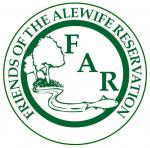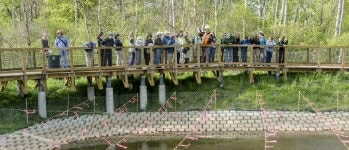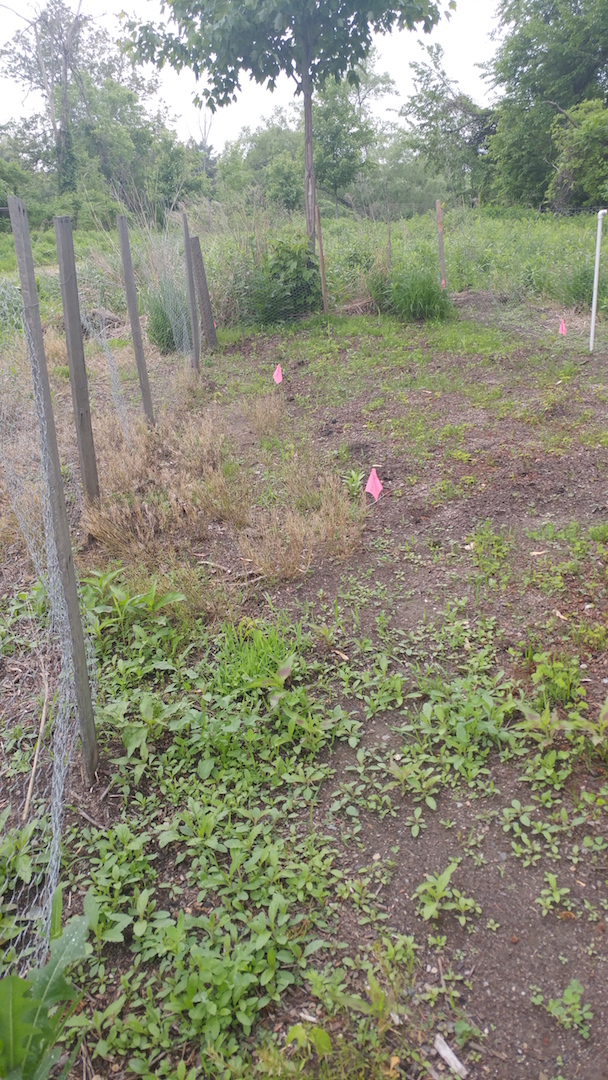The Quadrangle area has a rare urban green space that is a paradise for wildlife and a living laboratory that allows us to see the effects of both climate change and excessive development, such as the 2000 plus units planned for the area. This spectacular natural system, which is sequestering carbon in its grassland and mature woodlands, provides habitat for rabbits, snakes and other terrestrial creatures and also contains a pond (Blair Pond) that is inhabited by fish and frequented by herons, ducks and other fowl. From a distance the pond looks healthy, but it is still being polluted by water coming from Claypit Pond and Wellington Brook in Belmont as well as from the nearby Cambridge Highlands neighborhood.
In this series of pictures, FAR president Ellen Mass visits Blair meadow, where soils experiments are being conducted by biology students from Lesley University, and a rain garden and other conservation measures have been implemented. A rain barrel, provided by a city worker, captures rain and holds it for use later during summer drought.
You can visit this urban gem, which is owned by the Department of Conservation and Recreation, by bike, car or other transportation; simply go to the cul-de-sac at the end of Mooney St in Cambridge. If navigating using Google Maps, you can use this map location as the destination.
This area is also a living laboratory for experiments exploring new and better ways to grow plants to sequester carbon and provide habitat to native wildlife. Here, students from Lesley University set up an experiment involving the use of biochar to enhance plant growth in soil that for many decades was nutrient deficient.
- Home
- Directions
- FAR Wildlife Blog
- Calendar
- News
- Donate Now
- Get Social!
- Storm Water Wetlands
- Plants and Restoration
- Photos
- Videos
- About & Projects
- Master Plan for Alewife
- Archive
- Newsletters
- Contact
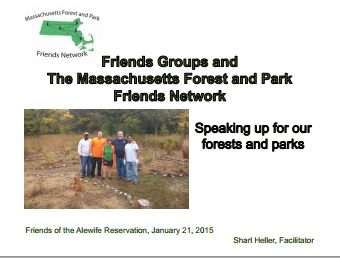 Presentation Spotlighting Alewife Reservation
Presentation Spotlighting Alewife Reservation
 Follow us on Twitter
Follow us on Twitter
 Like us on Facebook
Like us on Facebook
 Follow us on Instagram
Follow us on Instagram
Forward our web address to a friend!
- An Urban Gem - Alewife Reservation Nature Preserve
- Envisioning The Silver Maple Forest
- History and Policies of Cambridge, Belmont, and DEP
- Storm Water Wetlands
- Friends of Alewife Reservation brochure
(front, back) - Technical Analysis of Upper Alewife Basin
- Watershed: An Excursion in Four Parts
- The River Is A Restless Spirit: Life in the floodplain forest
-
Assessment of Silver Maple forest for DEP Adjudicatory hearings and
Patrick Fairbairn, author of the Assessment - Community Native Garden Flora
The
Alewife Reservation
is a unique natural resource for the communities of Belmont, Arlington and Cambridge
and home to hundreds of species, including hawks, coyotes beavers, snapping turtles, wild turkeys and muskrats,
the reservation is a unique natural resource for the community.
Historical information (Powerpoint)
Friends of Alewife Reservation works to protect and restore this wild area and the surrounding area for the water quality, native plants, animals and over 90 bird species with paths for walking, running and biking, recreation, and for classroom education and research. We regularly steward and preserve the Reservation area for wildlife and for the enjoyment of present and future generations.
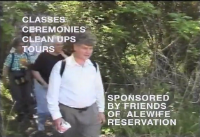
(video)
By-Laws
About Friends of Alewife Reservation
Statement of Purpose
Citizen Forester newsletter archive
The Birds of the Cambridge Region of Massachusetts

by William Brewster 1906
Nuttal Ornithological Society
Biodiversity Study of Alewife Reservation Area: Species, Habitat, Ecosystems

Inventories by David Brown, wildlife assessor (2003, 2004.) Published by and available from FAR for $10. Write or call for your copy. (sample)
Updated Dave Brown Inventories (2008, 2010)
Inventories of Alewife Reservation Wetland Plants by Walter Kittredge, Botanist (2013)
Email: alewife@greencambridge.org
Join our mailing list
For technical problems with this website, email: webmaster@friendsofalewifereservation.org
